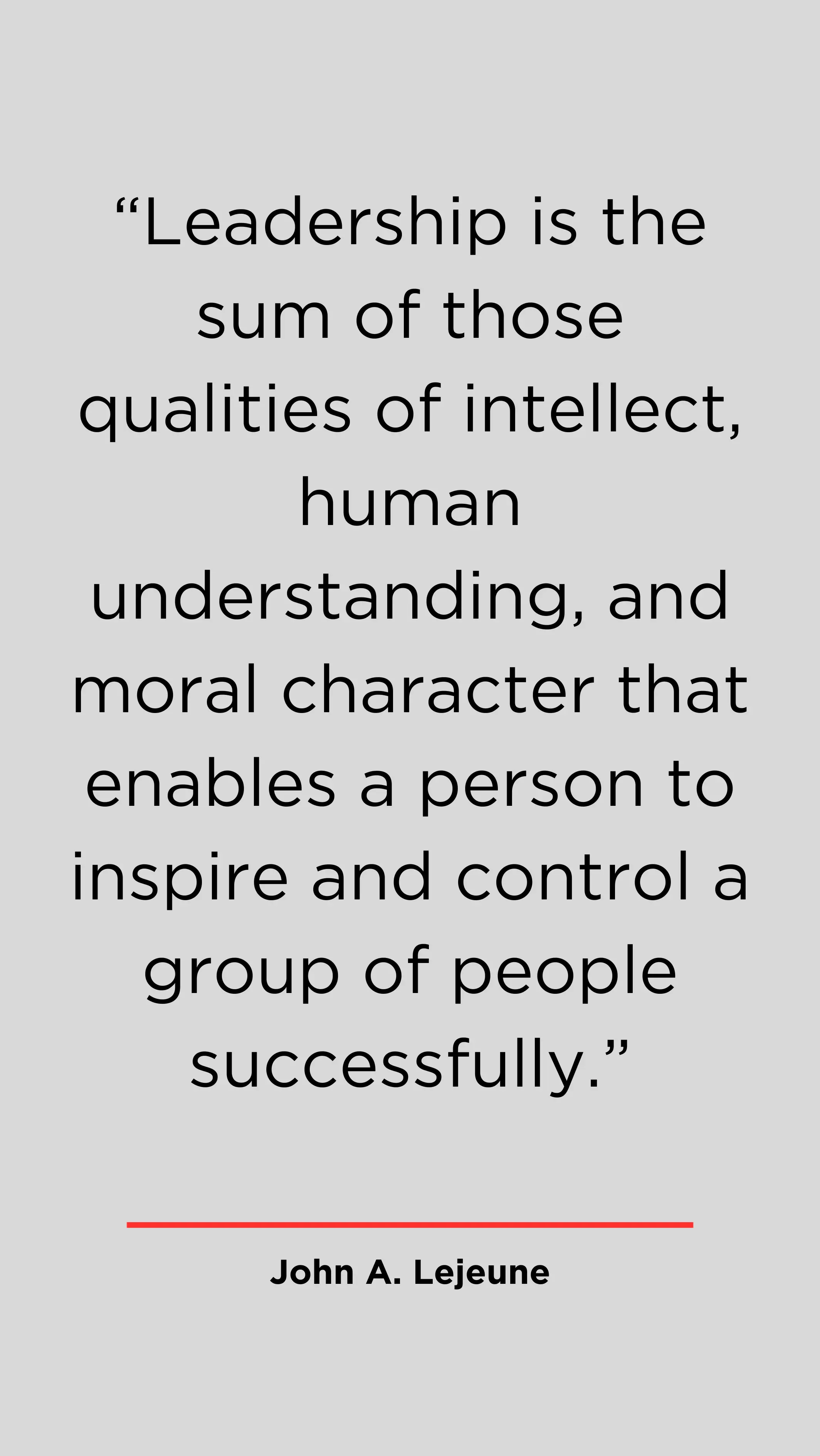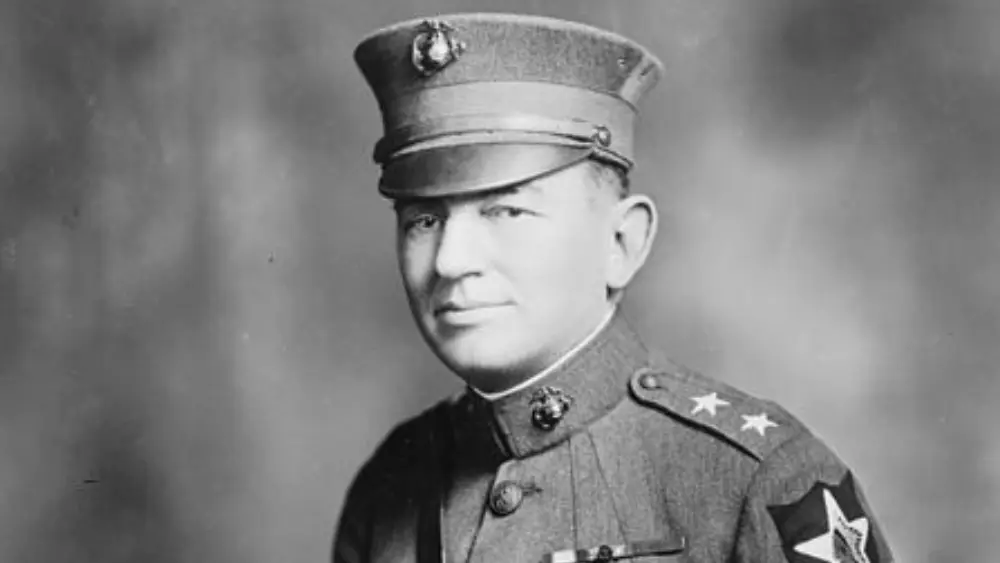John A. Lejeune, born on January 10, 1867, in Pointe Coupee Parish, Louisiana, stands as a legendary figure in the history of the United States Marine Corps. Renowned for his leadership, strategic brilliance, and unwavering commitment to the Corps’ values, Lejeune played a pivotal role in shaping the Marine Corps tradition and fostering the enduring spirit of Esprit de corps.
Early Life and Education
John Lejeune’s early life laid the groundwork for a distinguished military career characterized by duty and discipline. Born in Louisiana in 1867, he grew up in Louisiana, where the values of honor and service were deeply ingrained in the culture. This upbringing instilled in him a strong sense of duty and a commitment to a life of disciplined service. His journey into the military began when he entered the United States Naval Academy, graduating in 1888. The education and training he received at the academy not only equipped him with the knowledge necessary for a military career but also fostered the leadership qualities that would come to define his legacy.
Lejeune’s experience at the Naval Academy marked the beginning of a path that would lead him to become one of the most notable figures in the history of the United States Marine Corps. His early education not only provided him with the foundational skills for military service but also laid the groundwork for a career marked by exceptional leadership. The values instilled in him during his formative years would shape his approach to leadership and service, making John Lejeune a respected and influential figure within the Marine Corps and the broader U.S. military establishment.
John A. Lejeune: Service in the Caribbean and Latin America
Additionally, John A. Lejeune’s early career in the Marine Corps was marked by significant service in the Caribbean and Latin America. During this pivotal period, he not only demonstrated exceptional military prowess but also honed diplomatic skills that would later play a crucial role in his distinguished career. During this formative period, Lejeune not only gained invaluable experience in expeditionary warfare and diplomatic missions but also laid the groundwork for his future leadership roles. Consequently, the skills acquired during this phase of his career became instrumental in shaping Lejeune’s leadership style and prepared him for the multifaceted challenges that lay ahead. His assignments in the Caribbean and Latin America allowed him to hone his skills in navigating complex geopolitical situations, showcasing an early aptitude for strategic thinking and diplomacy.
Lejeune’s service in these regions not only contributed to his personal and professional growth but also established him as a capable and adaptable military leader. His experiences in the Caribbean and Latin America laid the foundation for the later stages of his career, where he would rise to the position of Commandant of the Marine Corps. The strategic insights and diplomatic finesse he demonstrated during these early assignments foreshadowed his future impact as a leader in the Marine Corps and underscored the importance of his contributions to the military’s engagement in international affairs.
World War I Leadership
With the outbreak of World War I, John A. Lejeune’s leadership abilities came to the forefront as he assumed command of the U.S. 2nd Division. In this pivotal role, Lejeune proved himself to be a capable and innovative leader, demonstrating strategic acumen that would leave a lasting mark on the Marine Corps and the broader U.S. military. One of the defining moments of his wartime leadership occurred during the Battle of Belleau Wood, a critical engagement where the Marine Corps earned a reputation for tenacity and bravery under Lejeune’s command.
Lejeune’s leadership during the Battle of Belleau Wood showcased his ability to inspire and lead in the midst of intense combat. The Marines, facing a formidable enemy and challenging terrain, displayed extraordinary resilience under his command. Lejeune’s strategic thinking and unwavering commitment to the mission played a crucial role in the successful outcomes of this pivotal battle. The reputation forged during World War I would solidify the Marine Corps as a formidable and respected force, and John A. Lejeune emerged as a celebrated military leader whose impact would extend beyond the war itself.
John A. Lejeune: Commandant of the Marine Corps
In 1920, John A. Lejeune assumed the role of the 13th Commandant of the Marine Corps, marking a transformative period in the history of the Corps. Recognizing the need to solidify the identity of the Marine Corps and foster a sense of camaraderie among its members, Lejeune embarked on a mission to shape the future of the organization. His tenure as Commandant was characterized by visionary initiatives that would leave an indelible mark on the Marine Corps and influence its ethos for generations.
Lejeune’s leadership during his term as Commandant included establishing the Marine Corps Institute, which provided professional military education to Marines. Additionally, he is credited with issuing the famous Marine Corps Birthday Message, which articulates the values and traditions that continue to resonate within the Corps to this day. Through his strategic vision and commitment to cultivating a strong institutional identity, Lejeune’s impact extended far beyond his immediate term as Commandant, contributing significantly to the enduring legacy of the United States Marine Corps.
Lejeune’s Blueprint: The Marine Corps Manual
John A. Lejeune’s leadership left an indelible mark on the Marine Corps, including a significant revision of the Marine Corps Manual. Under his guidance, this critical document underwent a thorough transformation to articulate the Corps’ doctrine, values, and principles. This revised manual became a cornerstone of Marine Corps training and education, providing a comprehensive guide that not only outlined tactical procedures but also instilled a shared ethos among Marines. Lejeune’s meticulous attention to the manual ensured that it encapsulated the core tenets of the Marine Corps, serving as a guiding beacon for Marines in their professional conduct and operational endeavors.
The Marine Corps Manual, shaped by Lejeune’s vision, became more than just a set of rules; it became a reflection of the Corps’ identity and a source of inspiration for its members. It not only provided a foundation for effective and disciplined military operations but also served as a unifying force, fostering a sense of pride and camaraderie among Marines. Lejeune’s emphasis on clearly defining the values and principles of the Marine Corps through the manual played a pivotal role in shaping the unique culture of the Corps and reinforcing its reputation for excellence and professionalism.
John A. Lejeune: Birthday Message and Tradition
John A. Lejeune instituted a venerable tradition within the Marine Corps—the annual Marine Corps Birthday Message. This tradition involves the Commandant delivering a statement on November 10th, reflecting on the Corps’ storied history and reiterating its steadfast commitment to duty. Lejeune’s foresight in establishing this tradition not only fostered a sense of camaraderie and shared identity among Marines but also provided a moment for collective reflection on the Corps’ legacy and principles.
The Marine Corps Birthday Message has grown into a cherished and integral part of Marine Corps culture, embodying the values and spirit that define the Corps. This annual tradition, initiated by Lejeune, serves as a unifying force, connecting Marines across generations and reinforcing the sense of pride and dedication that characterizes the Marine Corps ethos. The Birthday Message not only pays homage to the Corps’ illustrious past but also serves as a reminder of the enduring commitment and resilience that have become synonymous with the United States Marine Corps.
Development of Marine Corps Schools
John A. Lejeune, as a forward-thinking leader, recognized the imperative for professional development within the Marine Corps. To address this need, he championed the establishment of key institutions, including the Basic School and the Marine Corps Command and Staff College. Lejeune’s strategic vision emphasized the importance of cultivating leadership skills and intellectual capabilities among Marines. The Basic School, founded in 1919, served as a foundational institution for newly commissioned officers, providing them with the essential skills and knowledge required for effective leadership. The Marine Corps Command and Staff College, established later under Lejeune’s influence, further advanced professional development by offering mid-level officers a comprehensive education in military strategy and leadership, ensuring a well-prepared cadre of leaders within the Corps.
The institutions initiated by Lejeune became integral components of the Marine Corps’ commitment to excellence and leadership development. By establishing these schools, he laid the groundwork for a culture of continuous learning and adaptation within the Corps. Lejeune’s legacy in the realm of professional education continues to shape the Marine Corps, ensuring that its leaders are equipped with the skills and knowledge necessary to navigate the complex challenges of modern military operations.

John A. Lejeune: Legacy and Esprit de Corps
John A. Lejeune’s legacy is deeply ingrained in the very fabric of the Marine Corps, leaving an indelible mark on its culture, ethos, and values. Perhaps most notably, his influence is evident in the Marine Corps’ enduring sense of Esprit de corps, a term that captures the distinctive pride, camaraderie, and dedication shared among Marines. Lejeune’s emphasis on cultivating a unified and resilient Marine Corps identity has become a cornerstone of the organization’s success.
Furthermore, Lejeune’s legacy is prominently reflected in the Corps’ unwavering commitment to discipline and steadfast adherence to core values. Additionally, this commitment echoes through the annals of the Marine Corps, underscoring its enduring dedication to the principles instilled by General Lejeune. His strategic vision, particularly in the establishment of key institutions like the Basic School and the Marine Corps Command and Staff College, demonstrated a commitment to leadership development that continues to shape the character of Marine Corps officers. The legacy of John A. Lejeune lives on through the Marines who have been instilled with the values of honor, courage, and commitment, creating a lasting impact that transcends his time as Commandant. The Marine Corps stands as a testament to Lejeune’s leadership philosophy, embodying the enduring principles he set forth for the Corps over a century ago.




